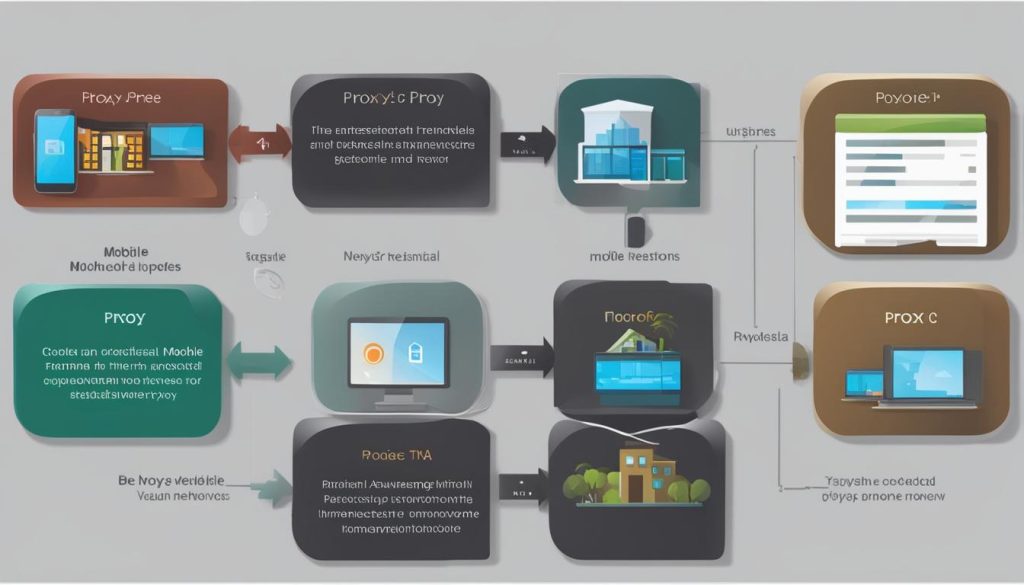Welcome to our article on mobile vs. residential proxies! In today’s digital age, proxies play a crucial role in ensuring online privacy, security, and accessibility. Two popular types of proxies are mobile proxies and residential proxies. While they share similarities, they also have distinct differences in their connection and rerouting methods.
Mobile proxies utilize IP addresses provided by mobile carriers, while residential proxies obtain IP addresses through home Wi-Fi routers. Residential proxies are rented from ISP customers, allowing users to access the internet through someone else’s IP, while mobile proxies are shared by hundreds of devices connected to phone masts and use 3-5G connections. Both types of proxies offer anonymity and the ability to bypass blocks, but there are important factors to consider when choosing between them.
Let’s delve deeper into the benefits and drawbacks of mobile and residential proxies to help you make an informed decision based on your specific needs.
Key Takeaways:
- Mobile proxies use IP addresses provided by mobile carriers, while residential proxies use IP addresses obtained through home Wi-Fi routers.
- Residential proxies are rented from ISP customers, while mobile proxies are shared by hundreds of devices connected to phone masts and use 3-5G connections.
- Both types of proxies provide anonymity and the ability to bypass blocks, but mobile proxies are generally more difficult to block due to the shared IP addresses.
- Consider factors such as cost, speed, and your specific use case when selecting between mobile and residential proxies.
- AnyIP is a reputable proxy provider that offers high-quality residential and mobile proxies suitable for various needs. Check them out for reliable proxy options.
How Residential Proxies Work
Residential proxies function by rerouting internet requests through someone else’s IP address and connection. This allows users to access the web from various locations, enhancing privacy and bypassing regional restrictions. One key feature of residential proxies is IP rotation, which assigns a different IP address for each connection. This technique makes it difficult for websites to detect the use of proxies and helps maintain anonymity.
Residential proxies boast large IP pools with millions of legitimate IP addresses, making them highly secure and hard to block. The extensive variety of IP addresses ensures that websites cannot blacklist entire proxy networks, enhancing their undetectability. Some providers even offer “Sticky IPs” that have a longer duration than standard rotating IPs, providing even more stability for users’ connections.
| Advantages | Disadvantages |
|---|---|
| Provides IP rotation for enhanced privacy | Can be more expensive compared to other proxy types |
| Offers a large pool of legitimate IP addresses | May experience slower speeds due to rerouting process |
| Hard to detect by anti-automation systems |
Despite their advantages, residential proxies can be more expensive than other options. Additionally, the rerouting process can lead to slower connection speeds compared to alternatives. It’s important to consider these factors when deciding if residential proxies are the right choice for your needs.
How Mobile Proxies Work
Mobile proxies provide users with a unique way to access the internet and protect their online identity. These proxies utilize 3-5G connections and connect to the internet through shared phone mast IP addresses. This makes them unblockable, as websites find it challenging to block a single IP address when it is shared among multiple devices. The use of mobile connections, however, can result in slower speeds compared to residential proxies.
One of the key features of mobile proxies is IP rotation. With each connection, users are assigned a new IP address, further enhancing their anonymity. This rotation ensures that websites and online platforms cannot track or identify the user’s real IP address. The ability to constantly switch IP addresses adds an extra layer of security and privacy.
It’s important to note that mobile proxies are generally more expensive than other types of proxies. The extensive infrastructure required to support these proxies, including the mobile network and the distribution of IP addresses, contributes to their higher cost. However, for users seeking unblockable access to the internet and the ability to constantly rotate IP addresses, mobile proxies can be a valuable tool.
Advantages of Mobile Proxies:
- Unblockable access: Shared IP addresses make it difficult for websites to block a single IP.
- IP rotation: Each connection is assigned a new IP address, enhancing anonymity and privacy.
Disadvantages of Mobile Proxies:
- Slower speeds: Mobile connections may result in slower internet speeds compared to other types of proxies.
- Higher cost: The infrastructure required to support mobile proxies contributes to their higher price point.
Now that we’ve explored how mobile proxies work, it’s important to consider their advantages and disadvantages when deciding which type of proxy is best suited for your needs.
Conclusion
When it comes to choosing between mobile and residential proxies, it’s important to consider your specific use case and preferences. Both proxy types offer IP rotation, geo location selection, and IP whitelisting, providing essential features for various online activities.
Mobile proxies, with their shared IP addresses from phone mast connections, are harder to block compared to residential proxies. This makes them a great choice if you need to bypass blocks and maintain anonymity. However, keep in mind that mobile proxies can be slower due to their reliance on mobile connections, and they are generally more expensive.
On the other hand, residential proxies provide the advantage of routing requests through legitimate home Wi-Fi routers, giving you access to different locations. While they may be slower and more expensive, their large IP pools with millions of IP addresses make them difficult to block. They are undetectable as proxies, thanks to IP rotation and the option of “Sticky IPs.”
Considerations and the Way Forward
When selecting a proxy type, it’s crucial to consider factors such as cost, speed, and the intended purpose of your online activities. Evaluate your needs and preferences and choose accordingly.
If you’re looking for a reliable proxy provider, consider AnyIP. They offer high-quality residential and mobile proxies that are undetectable by anti-automation systems. With competitive rates per gigabyte and a diverse range of data limits, AnyIP ensures you have a trustworthy proxy option to meet your specific requirements.
FAQ
What is the difference between mobile and residential proxies?
Mobile proxies use IP addresses provided by mobile carriers, while residential proxies use IP addresses obtained through home Wi-Fi routers.
How do residential proxies work?
Residential proxies route requests through someone else’s IP address and connection, allowing users to access the internet from different locations. They use IP rotation, providing a different IP address for each connection.
How do mobile proxies work?
Mobile proxies connect to the internet through shared phone mast IP addresses and use 3-5G connections. They are unblockable because IPs are distributed across multiple devices, making it difficult for sites to block a single IP.
Why are mobile proxies harder to block compared to residential proxies?
Mobile proxies use shared IPs from phone mast connections, making it difficult for sites to block a single IP.
What are the advantages of residential proxies?
Residential proxies offer benefits such as IP rotation, security, and being undetectable as proxies. They have large IP pools with millions of legitimate IP addresses, making them hard to block.
What are the advantages of mobile proxies?
Mobile proxies offer IP rotation, unblockable connections, and the use of shared IP addresses. They are also difficult to block due to the distribution of IPs across multiple devices.
What are the drawbacks of residential proxies?
Residential proxies can be expensive and slower compared to other types of proxies.
What are the drawbacks of mobile proxies?
Mobile proxies can be slower compared to residential proxies due to the use of mobile connections. They are also generally more expensive.
What factors should I consider when choosing between mobile and residential proxies?
Factors to consider include cost, speed, and the intended purpose of the proxies.
What is AnyIP and what do they offer?
AnyIP is a reputable proxy provider that offers high-quality residential and mobile proxies that are not detectable by anti-automation systems. They provide competitive rates per gigabyte and a diverse range of data limits.

